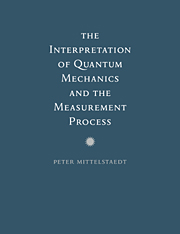2 - The quantum theory of measurement
Published online by Cambridge University Press: 05 November 2009
Summary
The concept of measurement
Basic requirements
In this chapter we give a brief account of the quantum theory of measurement. As already mentioned in the preceding chapter, the quantum theory of measurement treats the object system, as well as the measuring apparatus, as proper quantum systems. Here we restrict our considerations to a proper quantum mechanical model of the measuring process that makes use of unitary premeasurements. Furthermore, we will be mainly concerned with ordinary discrete observables of the object system that are measured by an apparatus with a pointer observable which is also assumed to be an ordinary discrete observable. These restrictive assumptions are made here and throughout the entire book in order to simplify the problems as much as possible. The remaining open problems of consistency, completeness, self-referentiality, etc. can then be discussed without unnecessary additional complications.
In order to characterize the concept of measurement in quantum mechanics, we formulate some basic requirements that must be fulfilled by any measuring process. In many situations, one can add further postulates, but these additional requirements are not essential for the concept of measurement. The basic requirements are in accordance with the most general interpretation of quantum mechanics, the minimal interpretation, which has already been mentioned in chapter 1. There is a general interplay between interpretation and the quantum theory of measurement, since the postulates that characterize a given interpretation must be compatible with, and capable of being satisfied by, a corresponding model of the measuring process.
- Type
- Chapter
- Information
- Publisher: Cambridge University PressPrint publication year: 1997



